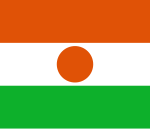| Political corruption |
|---|
 |
| Forms and concepts |
| Anti-corruption |
| Corruption by country |
Corruption in Niger has a long history in pre-colonial and colonial era, as well as in the curent time and has been a pervasive issue in the country's political, economic, and social landscape.[1] The colonial administration mismanaged public funds, leading to inefficiencies and waste. Corrupt officials often went unpunished, perpetuating a culture of corruption.
History[edit]
Pre-colonial era[edit]
Corruption existed in various forms in pre-colonial Niger, with instances of embezzlement, nepotism, and bribery among traditional leaders and traders. During the colonial era, corruption was prevalent among French colonial officials and African collaborators.
Colonial era (1920-1960)[edit]
French colonial rule introduced modern forms of corruption, including cronyism, and exploitation of natural resources. Governor-General Jean Moulin (1937-1940) embezzled funds meant for development projects, using them to build his personal mansion in Niamey. Colonel Paul Nougues (1940-1942) diverted funds intended for the military to his own accounts and French companies such as Compagnie Française de l'Afrique Occidentale (CFAO) and Société Minière de l'Air (SMA) extracted Niger's natural resources (uranium, gold, livestock) with little benefit to the local population. The French colonial administration forced Nigeriens to work in exploitative conditions in mines and on cotton plantations.
French officials accepted bribes from companies in exchange for favorable treatment and contracts. African collaborators such as Chief Amadou Djibo (1930s-1940s) used their positions to accumulate wealth and influence through corrupt means.
Colonial officials such as Commandant Léon Riou (1920s) used coercion and intimidation to maintain control over local populations. The French colonial administration imposed heavy taxes, forced labor, and land expropriation on Nigeriens.
The "Scandale des subsistances" (1935) saw French officials embezzle funds meant for food supplies, leading to widespread famine among the local population. The "Affaire des mines d'uranium" (1940s) involved French companies and officials colluding to exploit Niger's uranium resources, ignoring safety and environmental concerns.
Post-colonial era (1960-1999)[edit]
Following independence, corruption became more entrenched, with President Hamani Diori and his successor, Seyni Kountché, with accusations of embezzlement and nepotism. Corruption during Niger's post-colonial era was widespread and deeply ingrained. President Hamani Diori (1960-1974) took millions of dollars in public funds, awarded lucrative contracts to cronies and family members, and accumulated vast tracts of land and property.
President Seyni Kountché (1974-1987) established a repressive regime marked by human rights abuses, stole funds meant for development projects, and favored cronies and family members in business deals.
President Ali Saibou (1987-1993) continued the corrupt practices of his predecessors, mismanaged the country's economy, and faced allegations of embezzlement and nepotism.
President Mahamane Ousmane (1993-1996) failed to address corruption and nepotism, faced allegations of embezzlement and abuse of power, and was ousted in a military coup.
The Uranium Gate scandal saw officials use funds for personal expenses meant for the development of the uranium industry. The Food Crisis scandal involved government officials and businessmen embezzling funds meant for food imports, exacerbating a severe famine. The National Housing Scheme scandal saw officials embezzle funds meant for a national housing project, leaving thousands of Nigeriens without homes.
Military rule (1999-1999)[edit]
The military regime of Ibrahim Baré Maïnassara was marked by widespread corruption, including embezzlement and human rights abuses.[2][3]
The regime, led by Major Daouda Malam Wanké, was marked by embezzlement, with military officials looting public funds and assets, enriching themselves and their members.
Nepotism was also rampant, with Wanké favoring family members and close associate's in business deals and government appointments. Military officials used their positions to intimidate and exploit civilians, extorting money and resources. Corruption and human rights abuses went unpunished, perpetuating a culture of impunity. The Petromiangate scandal saw military officials embezzle funds meant for fuel imports, leading to widespread shortages and price hikes. The CFAO scandal involved the embezzlement of funds from the state-owned company CFAO, meant for agricultural development.
Human rights abuses were widespread, with military officials committing extrajudicial killings, torture, and arbitrary arrests, often for personal gain. The military regime's corruption and brutality sparked widespread protests, leading to Wanké's ouster in April 1999.[2]
Democratic era (1999-2009)[edit]
The return to democracy saw some efforts to combat corruption, but it remained a significant problem, with President Mamadou Tandja accused of embezzlement and electoral fraud.[4]
Coup and political unrest (2009-2011)[edit]
The military coup that overthrew President Tandja led to a period of political instability, during which corruption continued to thrive.[5][2]
Current era (2011–present)[edit]
While President Mahamadou Issoufou has made efforts to tackle corruption, it remains a significant challenge. Key corruption scandals in Niger include the Uranium Gate scandal, Petromiangate scandal, Sonatrach scandal, and Imouraren uranium mine corruption allegations.
Efforts to combat corruption in Niger include the establishment of the National Commission for the Fight against Corruption, adoption of the United Nations Convention against Corruption, and implementation of the African Union's Convention on Preventing and Combating Corruption.[6][7][8]
See also[edit]
References[edit]
- ^ "Niger: NGOs complain over alleged loss of $99m in state funds". Al Jazeera. Retrieved 2024-06-14.
- ^ a b c "Timeline: A history of coups in Niger". Al Jazeera. Retrieved 2024-06-14.
- ^ https://www.news24.com/news24/niger-ordered-to-compensate-mainassaras-family-20151023
- ^ "Anti-Corruption Fight in Peril: Crackdown on Anti-Corruption Human Rights Defenders in West and Central Africa - Niger | ReliefWeb". reliefweb.int. 2023-07-11. Retrieved 2024-06-14.
- ^ "Niger coup: Is France to blame for instability in West Africa?". 2023-08-06. Retrieved 2024-06-14.
- ^ AfricaNews (2023-11-17CET09:54:19+01:00). "Niger's junta chief sets up anti-corruption body". Africanews. Retrieved 2024-06-14.
{{cite web}}: Check date values in:|date=(help) - ^ Burke, Jason; correspondent, Jason Burke Africa (2020-08-06). "Niger lost tens of millions to arms deals malpractice, leaked report alleges". The Guardian. ISSN 0261-3077. Retrieved 2024-06-14.
- ^ "Niger: Junta is fueled by anger against a 'sick democracy'". Le Monde.fr. 2023-08-09. Retrieved 2024-06-14.